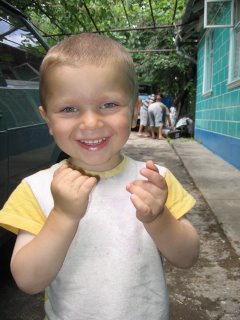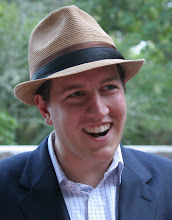La inmormantare
It's been a long time since I've written here. There are many reasons: I've been incredibly busy, teaching 27 hours a week and also doing other projects; my computer problems in the past few months got me out of my blogging rhythm; and I had a couple of blog-related incidents with my community that made me hesitant to write anything at all about my life or work in the village. But I think a major hindrance was pure writer's block. I had in my mind for months that if I was going to write anything on my blog, it needed to be a particular entry about a particular event. It has taken me a long time to get it into writing, because it's not an easy topic. I'm not bothering to edit it, because I need to just post it and get it over with. Hopefully, this will be the end of my writer's block, and I can move on.
I hadn't spoken to my old Costesti host family since I had visited them in late July, so I was hesitant to answer my cell phone on a Sunday evening several weeks ago.
"Noroc, Valodia!" I said to my 16-year-old host brother, since his name had shown up on my caller ID.
"Noroc, Peter," said the voice on the other end of the line, which didn't seem to be Valodia, but a woman. "How are you?" she continued in Romanian.
"I'm good," I responded. "How are you?"
"Peter, something bad has happened to our family," said the woman whom I now realized was my old host mom, Mila. "Octavian died, and we're having the funeral tomorrow. We wanted to invite you."
Octavian was my host cousin, who was the cutest two-year-old I had ever seen when I first came to Moldova. His mother, Nadia, was my host dad's sister and was only a year or two older than me. She and her husband, Slavic, were some of the nicest people I've met in Moldova. Octavian had been only four years old when he died that Saturday.
When I received the call, I was in Chisinau, where I was waiting for a medical appointment Monday morning. I told Mila on the phone that I wasn't sure I could arrive at the funeral on time, since I had classes in my village from 1 to 3 p.m. the next day. She said the funeral was at 2, and that she hoped I could come. If there was ever a time that I needed to call the other English teachers at the school and ask them to take my classes, today was it. I told Mila I would be at the funeral.
I hung up and began thinking of Octavian as I walked along the street. I had seen him a handful of times during my summer training, back when he was talking in the same mashed-up gibberish that all two-year-olds use, which didn't blend well with my low-level Romanian skills at the time. Nevertheless, he was an adorable, energetic and well-behaved kid, and one particular picture I took of him is one both mine and my mom's favorite photos I've taken in Moldova. Since that summer in 2005, I had seen him a couple more times, during visits to Costesti.
Oddly enough, one of my first thoughts was that I was shabbily dressed for a funeral. In a country like Moldova that puts so much emphasis on dressing correctly, I didn't know how I could show up at the funeral wearing jeans, a t-shirt, a sweater, a canvas jacket and sneakers. I asked a Peace Corps staff member if I needed to find a way to get back to my village and put on nicer clothes before the funeral, but she said that I was dressed fine for a village funeral. Besides, I reasoned, I was not going to be the center of attention tomorrow, so it didn't matter much.
The next afternoon, I took the short rutiera ride to Costesti, and began walking up the hill to Slavic and Nadia's house. I arrived at the house at one o'clock, holding a bouquet of four yellow flowers (even numbers of flowers are given only at funerals). The gates to the front yard were open, and dozens of mourners were already inside the yard and standing out on the street. I walked inside the yard and found Valodia. I went to shake his hand and offer him my condolences, but he kept both hands in his jacket pockets.
"We don't shake hands at funerals," he said.
We talked briefly, then I made my way toward the house. His grave marker, a metal cross, stood on a post leaning against the side of the house, with a shirt draped over the arms of the cross. On the porch was a small memorial, mostly composed of photos of Octavian, including several taken by me. Normally, you take your shoes off before entering a Moldovan house, but the family had laid down clear plastic tarpaulin along a path leading into Octavian's bedroom. As I walked in, I saw Mila and some of the other female relatives in the hallway, who looked at me with eyes that had been reddened by tears for several days straight. I nodded and repeated, "My condolences," to them as I made my way into the bedroom.
There were about 10 women and girls in the small bedroom, with Octavian laying in an open coffin along the right-hand wall, dressed in a suit and with his hair perfectly combed. His grandmother was just inside the door and was crying the most, repeatedly pleading, "Come back to Grandma, Octavian." I laid the flowers in the coffin, assuming that that was what I was supposed to do, and crossed myself in the Orthodox style, ending on the left side. I staid in the room for about a minute as the grandmother continued, "Do you remember what a wonderful boy he was, Peter? Any time we got in the car, he would always be so happy and say, 'Where are we going, Grandma?' Octavian, come back!"
Then I saw Nadia for the first time, standing in the far corner of the room, a mix of shock and devastation. I barely recognized her because she suddenly looked five years older than she ever had before. I couldn't even start to think of things to say to her in any language, so I left the room and went back outside.
I joined a circle of men, some of whom knew who I was, and after a few minutes asked what had happened. They explained in medical terms that I didn't fully understand that something had ruptured near the base Octavian's brain because a specific membrane had not fully developed. He had entered into a coma for 14 days, including his fourth birthday, and died in a Chisinau hospital. There had been absolutely no indicators beforehand that he had this medical condition.
We spent the next hour waiting outside for the priest to come, and I got pulled into some conversations about Peace Corps and America and other subjects. By the time the priest came, there were over 100 mourners, including children from Octavian's preschool class. Six pallbearers, including Valodia and several of the men with whom I had picked strawberries in my first month in Moldova, went inside and brought out the body and coffin. The priest recited a blessing, and the procession began walking. We walked over a mile down one large hill, across a bridge and up another hill to the church, stopping at every well and cross along the side of the road so the priest could read another blessing. Nadia walked behind the coffin with only her sisters-in-law to comfort her, since her husband had a broken leg and had to follow in a car and her two brothers were already working in Russia for the winter. She broke down several times during the procession and began calling, "How can a mother remain without her son? Come back, Octavian!"
Each time the procession stopped, someone left behind a small bag that included a colac, which is an ornate ring of bread used in ceremonies, candy, wine, and other items. These bags are given to friends and youths "from the soul of the dead". My turn came near the end, at a bridge between the two hills. Mila picked the bag off the ground and handed it to me, along with a glass of wine. I drank the wine and accepted the package, which also included a small rug, about four feet by two feet.
The one thing that I can actually look back on the funeral procession and smile about is one of the godfathers, whose job it was to carry around a 10-liter pail full of wine and walk among the procession offering people a drink. I don't know how this tradition started, but it's probably what gave me a cold for the following week.
When we arrived at the church, we stood outside for several minutes while both Slavic and Nadia said some words. I could barely hear, but just listening to the fluctuations in Nadia's voice were enough to make me tear up. Then everyone came into the church, filing through in an orderly fashion and kissing every single icon in the church. Kissing icons has absolutely nothing to do with my own faith, so I passed on that, but I did buy and light two prayer candles. The priest said some words about how God takes each person at the right time, whether or not we understand it. I know a major purpose of religion is to help ease the pain in difficult times like the death of a young child, but I don't think anyone was very comforted. Then each family member and godparent kissed Octavian on the forehead and on the icon in his coffin.
After about 20 minutes at the church, the pallbearers lifted the coffin again and the procession went up the final 200 feet of hill to the cemetery. Octavian was lowered into his grave as more than 100 mourners gathered round. The priest said some more words, and then Nadia, nearly crumbling from tears, tossed a clump of dirt on the coffin. The pallbearers, including Valodia, picked up their shovels and began the burial. Several of the pallbearers, grown men, were weeping as they continued to pile on the dirt. One of Octavian's classmates said, "But tomorrow he'll be at school, right?"
Most of the crowd left for the lyceum near Nadia and Slavic's house, where a huge feast had been prepared. Even in the saddest times, Moldovans still pile more food on the table than you could possibly eat. I sat near the priest and Octavian's grandfather, and enjoyed the conversation as much as I possibly could. Since I had to catch a rutiera back to Chisinau and then back to my village, I had to excuse myself early, just as the sky was darkening at 5 p.m. I said my first words to Nadia from the entire day, telling her to stay strong, which were the best words I could think of in any language.

Octavian Veceslav Cutu
November 1, 2002 - November 10, 2006
Labels: customs and traditions, religion


2 Comments:
I am glad you are writing again, although saddened by your entry. We are creatures that need explanations for everything, even when there is no explanation for what happens. Just know that your presence and friendship does bring comfort to the family and honours the young child. It seems so little, but it can be huge to those (including yourself)grieving. Pam B.
Porbably the most heart-gripping part about this entry is the following:
One of Octavian's classmates said, "But tomorrow he'll be at school, right?"
...
Sa-i fie tzarina ushoara.
Post a Comment
<< Home